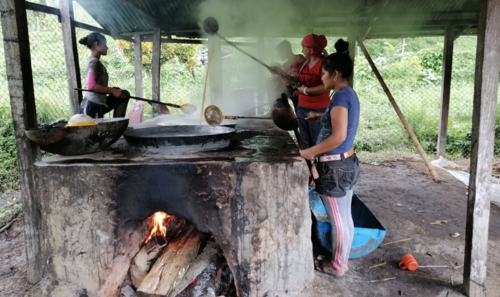
Volunteers of the nonprofit organization Operazione Colomba accompanying some members of the Peace Community to Mulatos village.
Indigenous ways of being often include the wisdom of a matriarch. In the first post below, about peace and chocolate in Columbia, a matriarch paints the story of her people (see the documentary) and explains their peaceful actions as a community amidst extreme violence.
From the simplicity of farming the land comes a way of peace. . .
Archangel Michael in my first reading with him, through Linda Dillon, channel for the Council of Love, November 29th, 2011, told me it was time for the Divine Feminine to rise to help create peace on Earth. Archangel Gabrielle told me the same thing – and even that the Mother asked him – Gabriel to emanate as Gabrielle – her.
On the other hand, the avocado farming in Mexico started out as a way of peace but has had incredible set backs. . . drugs, guns and violence. . . Time for change. . .
Cooperation and Chocolate:
The Story of A Colombian Community’s
Quest for Peace

A member of Comunidad de Paz de San José, a “Peace Community” in Colombia, cultivating cacao.
By Agostino Petroni, Yes Magazine, January 14, 2021
https://www.yesmagazine.org/economy/2021/01/14/harvesting-cacao-colombia-peace/
When it’s time for harvest, Germán Graciano Posso, a 38-year-old Colombian farmer, leaves his village, La Florencita, with a group of co-workers and heads into the hills where the cacao trees grow surrounded by a lush rainforest.
Cacao pods the size of giant lemons hang off the trees’ branches: They come in various colors—green, red, and purple—but tend to turn yellow when they ripen.
Posso harvests the fruits by hand, cracks them open with a machete, and collects the grape-sized seeds, which are covered in a white, squishy casing.
Then he places the seeds in a wooden box where the casing undergoes a process of fermentation. Finally, Posso spreads out the seeds on a flat surface to dry in the sun.
After eight days of drying, they will be ready to become chocolate.
This might seem a common agronomic practice, no different from the one conducted by other cacao growers worldwide, yet it carries a greater significance in this northwestern corner of Colombia.
Chocolate of Peace, award winning documentary
Posso belongs to the Comunidad de Paz de San José de Apartadó, a conglomerate of villages scattered in Urabá of Antioquia, one of Colombia’s deadliest areas.
For more than five decades, from 1964 to 2016, a bloody internal war between the Colombian army, right-wing paramilitary groups, and FARC (the Revolutionary Armed Forces of Colombia) killed more than 200,000 people.
In this war dictated by drug-traffickers’ interests (both FARC and right-wing paramilitary groups financed their fight by growing coca and trafficking cocaine), farmers were among those who paid the highest toll.
Over the past half-century, the United Nations estimates, more than 7 million Colombians—in a country of 49 million—were displaced by the war.

A harvest of cacao pods.

A member of the Peace Community opening a cacao pod.

Sieving organic cacao beans is part of the communal work of the Peace Community.

Production of sugar cane in the community.

Volunteers of the nonprofit organization Operazione Colomba accompanying some members of the Peace Community to Mulatos village.
America’s Appetite for Avocados
is Helping to Fuel the Mexican cartels,
but Giving up Guacamole isn’t the Solution

Farm workers load crates of freshly picked avocados into a truck at a plantation in Tacambaro, in Michoacan state, Mexico, June 7, 2017. Picture taken June 7, 2017
By Falko Ernst, Business Insider, February 23, 2020
- US consumption of avocados has increased drastically in recent years.
- But the increase has also become a boon to Mexican cartels, who have extorted avocados farmers for money.
- While the long-term solution to this problem will require serious reforms in Mexico, US consumers can help to advocate for change from avocado buyers.
- But boycotting avocados altogether will not help the thousands of people employed on the avocado farms.
- Falko Ernst is Senior Analyst Mexico at the International Crisis Group based in Mexico.
- This is an opinion column. The thoughts expressed are those of the author.
For Mexico’s avocado producers, the explosion in their crop’s popularity has brought a veritable green gold rush, but it also has a darker side. So rich in nutrients they are widely labeled a “superfruit,” consumption of avocados in the US alone has doubled in the last ten years to make for a $2.4 billion market.
As a result, everybody from producers down in Mexico, which provides 80% of what is consumed in the States, to your local Whole Foods has been making a killing.
The issue: so has Mexican organized crime, literally. Above all in the state of Michoacán, which exports 90% of Mexico’s avocados, the bloodshed is no longer “just” about drugs. It is also about avocados.
Splintering criminal organizations set the stage
To understand how Mexican organized crime got its fingers into the guacamole bowl, you need to zoom out and see that what looks like a “drug war” from afar has long mutated into something much more complex – and dangerous.
Mexican organized crime used to be all about producing and shipping drugs to the US, by far the largest illicit drug market world-wide. Feeding U.S demand was and remains a highly lucrative business for the narcos and politicians getting a juicy cut in exchange for turning a blind eye. That’s always been the case.
But twenty years ago, something did change. Until the year 2000, Mexico was governed for an uninterrupted 71-year stretch by a single authoritarian party. That party might have been a synonym for corruption, but it did manage to impose certain rules onto the narcos and keep violence in check.
Then came democracy and former president Felipe Calderón’s attempts to go after the cartels head-on. Regional governments became more autonomous, opening up new avenues for corruption in the absence of effective oversight.
And Calderón’s notion that taking out criminal leaders would see their organizations crumble time and again instead led larger cartels to fracture and proliferate. In late 2006, there were six major criminal organizations in Mexico. Today, there are many dozens smaller ones that have proven harder to control and far more aggressive than most of their larger forebears.
In a situation where no one is truly in control anymore – neither the state nor a single dominant criminal group – and there is no-one to impose rules, the default means for these groups to sort out their affairs with each other is violence.
Extracting the local resources
Many of today’s illegal armed actors more closely resemble micro warlords than the leaders of large, sophisticated criminal organizations. Drugs do still play a role, but the business model has prominently shifted toward extracting profits from whichever commodity is locally available.
The reason for the shift away from drugs is twofold. First, it’s easier – think not having to ship merchandise for thousands of miles through hostile terrain, not having to bribe officers along the chain and still risk losing it all to law enforcement and not having personnel arrested or killed. Second, there usually is no state actor capable or willing to keep a criminal group from going after licit crops and other resources.
Hence, Mexican organized crime has turned to extorting whoever does well in a given sector or taking over businesses directly – be that logging, mining, agriculture, public transport, or even mom and pop tortilla shops.
This is where avocados come into play. The super fruit is a big magnet for the warlords, the more so due to the recent explosion of demand and prices on global markets.
For local growers, in many cases, it means a visit from the warlords’ men — usually starting with a plain-clothed envoy to respectfully inform the grower that a protection payment is expected.
If the grower fails to comply, the next visit will often be by pick-up trucks loaded with sicarios, or enforcers. The pressure can then escalate into violence in the form of beatings, torture, disappearances, or even killings. Farmers, their families, and their employees are all at risk. Businesses and orchards can be simply expropriated by force.
These criminal groups get away with these actions because, in contemporary Mexico, you can literally get away with murder. Due to corruption and collusion victims usually have nowhere to turn to for help, and less than one in 10 homicides gets solved.
A showdown over avocados
The billion-dollar-a-year avocado industry has generated a fierce battle between different armed groups who seek to dominate it.
The Jalisco Cartel – Mexico’s up-and-coming criminal powerhouse now that the Sinaloa Cartel’s El Chapo has been locked away in the US – is going for it, as are a handful of regional warlords.
Just in August, the city of Uruapan, a major avocado hub, woke to the gruesome find of 19 human bodies dumped on its streets. Some of the bodies were hung from a bridge, a common way for criminal groups to try to intimidate rivals.
Since then, the killing has continued, in spite of governmental vows to end it by sending in the National Guard, a new militarized police force. In Michoacán, an average of five people are killed every day.
What to do about it
The avocado conflict provides a glimpse of a far wider and more complex armed conflict that has enveloped organized crime, the government, and everyday Mexicans. 250,000 people have been murdered in the country since 2006, and at the current rate more than 30,000 people are added to this total every year.
There is no quick fix for the situation. The reforms that are necessary to cleanse Mexico’s institutions and enable them to do their job — including through more effective oversight and by better training, paying and protecting the people who work for them —will require years of gradual, painstaking effort from all sides.
Meanwhile, precisely because conflict avocados are but a symptom of larger dysfunction, a boycott would do more harm than good.
Avocado production sustains thousands of hard-working, peaceful families in Mexico. No longer consuming what they produce would mean pulling the rug out from under their feet, and most likely prompt criminal groups to prey on civilians even more aggressively to make up for lost income.
Still, there are things international consumers can and should do.
They can ask the companies they buy produce from not to remain silent bystanders to human rights crises in producing regions such as Michoacán.
The private sector and investors can be a crucial voice in pushing governments toward needed reforms to fight impunity, beginning with the strengthening of police and the justice system in Mexico.
Finally, addressing the role of the US guns in keeping deadly conflict in Mexico ablaze is another necessary remedy.
The guns Mexican organized crime uses to threaten and kill avocado producers are predominantly made in the US, flowing south from gun shops in the border area.
Domestic pressure to curb the tide of guns into Mexico could go a long way in making Mexico a more peaceful place.
Boycotting Mexican avocados would not.
Invoking the Divine Realms,
the Ascended Masters,
our Star Brothers and Sisters,
including the Healers of Tralana,
the Halion Engineers, the Hathors
and the Divine Mother for help
with OUR BALANCE


The Mother’s Blue Diamond Energy of Hope, rise of the Divine Feminine to create BALANCE in the Americas, North and South
Invoking Sanat Kumara
& the Universal Law of Change
to help us to change into Who WE Are,
to change what doesn’t work
& to bring in what does.



